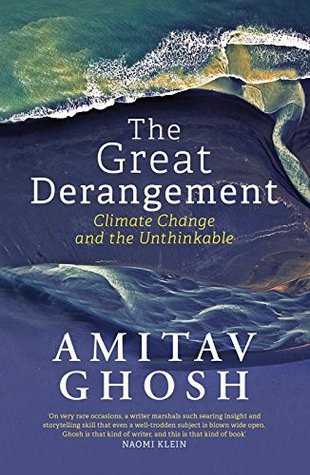More on this book
Community
Kindle Notes & Highlights
by
Amitav Ghosh
Read between
October 14 - October 29, 2022
Indeed, this is perhaps the most important question ever to confront culture in the broadest sense—for let us make no mistake: the climate crisis is also a crisis of culture, and thus of the imagination.
It is indisputable, in any event, that catastrophes waylay both the earth and its individual inhabitants at unpredictable intervals and in the most improbable ways.
‘In an early stage of advancement, when a great number of natural appearances are unintelligible, an eclipse, an earthquake, a flood, or the approach of a comet, with many other occurrences afterwards found to belong to the regular course of events, are regarded as prodigies. The same delusion prevails as to moral phenomena, and many of these are ascribed to the intervention of demons, ghosts, witches, and other immaterial and supernatural agents.’
And it appears that we are now in an era that will be defined precisely by events that appear, by our current standards of normality, highly improbable: flash floods, hundred-year storms, persistent droughts, spells of unprecedented heat, sudden landslides, raging torrents pouring down from breached glacial lakes, and, yes, freakish tornadoes.
But in the era of global warming, nothing is really far away; there is no place where the orderly expectations of bourgeois life hold unchallenged sway. It is as though our earth had become a literary critic and were laughing at Flaubert, Bankim, and their like, mocking their mockery of the ‘prodigious happenings’ that occur so often in romances and epic poems.
Consider that the literary movements of the twentieth century were almost uniformly disdainful of plot and narrative; that an ever greater emphasis was laid on style and ‘observation’, whether it be of everyday details, traits of character, or nuances of emotion—which is why teachers of creative writing now exhort their students to ‘show, don’t tell’.
It is surely no coincidence that the word uncanny has begun to be used, with ever greater frequency, in relation to climate change. Writing of the freakish events and objects of our era, Timothy Morton asks, ‘Isn’t it the case, that the effect delivered to us in the [unaccustomed] rain, the weird cyclone, the oil slick is something uncanny?’ George Marshall writes, ‘Climate change is inherently uncanny: Weather conditions, and the high-carbon lifestyles that are changing them, are extremely familiar and yet have now been given a new menace and uncertainty
This possibility is not, by any means, the most important of the many ways in which climate change challenges and refutes Enlightenment ideas. It is, however, certainly the most uncanny. For what it suggests—indeed proves—is that non-human forces have the ability to intervene directly in human thought. And to be alerted to such interventions is also to become uncannily aware that conversations among ourselves have always had other participants: it is like finding out that one’s telephone has been tapped for years, or that the neighbours have long been eavesdropping on family discussions.
can we help but suspect that all the time that we imagined ourselves to be thinking about apparently inanimate objects, we were ourselves being ‘thought’ by other entities? It is almost as if the mind-altering planet that Stanislaw Lem imagined in Solaris were our own, familiar Earth: what could be more uncanny than this?
There is an additional element of the uncanny in events triggered by climate change, one that did not figure in my experience of the Delhi tornado. This is that the freakish weather events of today, despite their radically non-human nature, are nonetheless animated by cumulative human actions. In that sense, the events set in motion by global warming have a more intimate connection with humans than did the climatic phenomena of the past—this is because we have all contributed in some measure, great or small, to their making. They are the mysterious work of our own hands returning to haunt us
...more
I understood also that what I had seen in the Nicobars was but a microcosmic expression of a pattern of settlement that is now dominant around the world: proximity to the water is a sign of affluence and education; a seafront location is a status symbol; an ocean view greatly increases the value of real estate. A colonial vision of the world, in which proximity to the water represents power and security, mastery and conquest, has now been incorporated into the very foundations of middle-class patterns of living across the globe.
The southern part of the archipelago passed into British control when King Charles II married Catherine of Braganza in 1661: the islands were included in her dowry (which also contained a chest of tea: this was the Pandora’s box that introduced the British public to the beverage, thereby setting in motion the vast cycles of trade that would turn nineteenth-century Bombay into the world’s leading opium exporting port).


